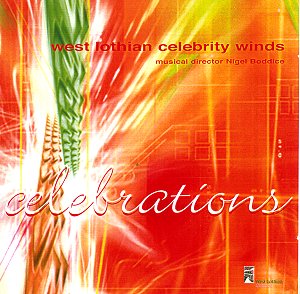To fill two CDs with wind band music – contemporary
Scottish music at that – is a bold venture. But Nigel Boddice
and his accomplished West Lothian wind band players have succeeded
superbly in choosing music, contemporary or no, that is immediately
appealing – most of it tuneful (it can be whistled!) and at the
same time presenting a showcase for Scottish composers whose work
is not always allowed the exposure to secure the credit that is
certainly due them. This is a joyous concoction – and the commitment
of director and players comes through from the very first bars.
The double disc, appropriately entitled ‘Celebrations’
begins ‘festively’ with a delightful spin round the flowers of
Maxwell Geddes’ native county of Galloway. The musical dialect
is fragrantly local from folk elements of his own devising.
John Purser said of the late Thomas Wilson "He
is not a composer in whose musical company one can often relax,
but the technical assurance and expressive integrity of his music
have earned him the proper respect of his contemporaries and successors,
for whom he has now become an elder statesman" (Scotland’s
Music Mainstream 1992 pp.256/7). Though probably best known for
his orchestral portrait ‘Touchstone’ his enigmatically entitled
‘Cartoon’ is virtuosic, originally for brass but here arranged
by the conductor. Its two Scherzo sections are amiable enough
and frame a centre whose lyrical quality is sombre, yet without
severity, its darker moments providing a foil for the lighter
music in this collection.
Edward McGuire’s ‘Sirocco’ begins naturally with
a susurration, a whisper developing an insistent pulse as it explores
a kind of musical travelogue before blowing itself out on the
west coast of Scotland.
The next piece, a Symphonic Ode by Peter Innes,
purports to tell a story. Its heraldic fanfare, a call to arms,
suggests high romance, illustrated in the complex harmonies of
the central section. This quasi-Gothic quality culminates in a
triumphal march.
The final track on the first CD is from Cedric
Thorpe Davie – a brilliant toe-tapping set of variations and an
astonishing fugue on the popular ‘Wee Cooper o’ Fife’. This is
truly whistling stuff – even of the syncopated fugue, and in its
all too short duration Thorpe Davie, the renowned composer of
film music, wrings the utmost from the ‘nickety nackety’ rhythm,
even investing this musical doggerel with music that might easily
suit a Hollywood epic, whose festive clamour collapses in the
cheekiest of endings.
Bruce Fraser opens the second disc with his piece
which gives the title to the recording. ‘Celebrations’ is in three
movements, the first introduced by a sombre solo trumpet which
leads to a perky dance in 11/8 gradually gaining momentum and
becoming as breezy as anything in Aaron Copland. It is richly
scored with some lush sounds. The second movement is rather more
dark-hued, a swelling barcarole-like chordal pattern underpinning
the lyrical voices of alto sax and cor anglais. The final movement’s
fanfares and trenchant Holstian movement recalls for me the writing
of Walter Hartley (who like Grainger and Derek Bourgeois wrote
well also for wind band)
Martin Dalby’s ‘Plain Man’s Hammer’ (after Boulez’s
‘Le Marteau sans maitre’) begins seriously, but with warmth, its
dark melodic movement decorated with an insistent chirruping woodwind
figure. With an Ibert-like transition the music suddenly descends
into a kind of circus "parade of parodies" – a Satie-like
waltz, a tango, a March whose echoes of ‘Ach du lieber Augustin"
suggests Mahler – some ‘blues’ from the big screen, another trumpeting
March which, says the composer, seems somehow to get out of hand.
With a ghostly echo of ‘Oranges and Lemons’ and some Spanish-sounding
bars the opening material returns, but reflectively, the chirruping
figure on hand officially to bless the proceedings.
The music of ‘The Lost Mountain’ by William Sweeney
opens with a forlorn pibroch–type oboe melody which develops in
a web of counterpoint. Its climax, and descent therefrom seem
to follow the contours of the mountain – its passage redolent
of the desolate vistas of the Highland landscape.
The concluding work in this exciting programme
is ‘Portrait of a City’ – a brilliantly festive rival to John
Ireland’s ‘London Overture’. The warm mid-section suggests the
lull of the stroll in the park before the resumption of the bustle
and the jostling crowds (among whom one senses a squad of sailors?)
The variety of colour in the absence of string
tones is a miracle of contrast and colour, well deserving the
title of the discs. The performance is masterly, the musical direction
beautifully controlled – and above all the clarity of the sound
is to be highly commended. It would make an ideal Christmas present
– and the support of the venture by West Lothian Council is to
be applauded. I hope it will be followed by others.
Colin Scott-Sutherland
